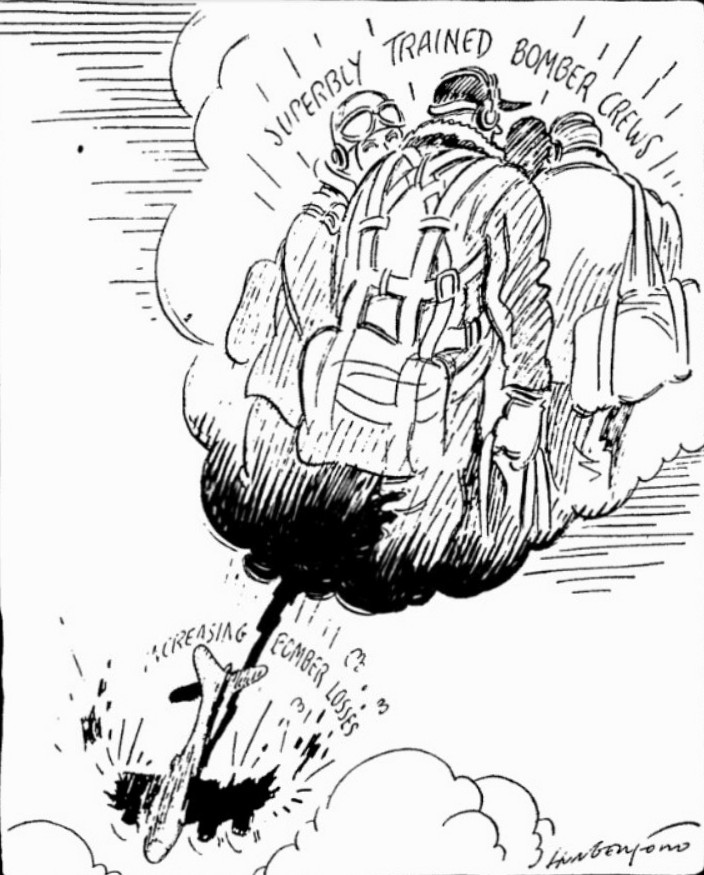The Pittsburgh Press (October 23, 1943)

I DARE SAY —
Words and pictures
By Florence Fisher Parry
The other day, Cy Hungerford drew a cartoon, following the American Fortress attack upon Schweinfurt with its terrible loss of our fliers. It was called “The Real Loss.” It seems to me that this cartoon deserves acknowledgement in the rival local press as it undoubtedly will receive elsewhere, and I should like to be granted that privilege here.

(Hungerford)
The cartoon showed a burning Fortress plummeting to earth; but soaring above, on their way to “that unknown country from whose bourne no traveler returns,” were the incorporeal figures of the crew just killed. The men were not pictured as happy ghosts facing some bright celestial adventure. They were, instead, pictured as tired, sorrowful American boys, reluctant to leave this mortal world and all it held for them.
One of the boys is looking back longingly, as though to crystallize eternally the dear and fading picture of his beloved earth. The cartoon seemed to me to contain the very essence of greatness, and it made me think somehow, of an immortal cartoon which was drawn by J. N. Darling in the Herald Tribune, just after the death of that great Roosevelt, Theodore, and called “The Long, Long Trail.” It showed our “Rough Rider” on his horse, with his head held high and facing eternity, and below were the words, “My marks and scars I carry with me.”
Epitaph
Now curiously enough, the very day that this cartoon of our dead fliers appeared, there was published a photograph, which, in its way, invited the soul to the same solemn retreat. It was a very unexpected picture, one which easily could have been suppressed in the interests of propaganda. I was glad to see that we were honest enough to publish it.
Up in Kiska, an American flier fell in enemy territory, and the Japs buried him and erected above the bleak cold grave a crude wooden board, with a kind of slanting “roof” to protect the painstaking scrawl beneath, written by some Jap who knew some English.
This is the epitaph:
Sleeping here, a brave air-hero who lost youth and happiness for his Mother land. July 25 – Nippon Army.
In this simple and eloquent epitaph, we find a perfect example of the perfect use to which basic English can be put. Search your mind, if you will, for a more perfect phrase with which to describe the sacrifice young men are making today all over the world.
Words and pictures, words and pictures – how great their power now! The power of the cartoonist today compares with that wielded by the greatest statesman or the mightiest pen. The photographs and motion pictures which are even now being given unsparing presentation in the newspapers and newsreels, surpass the terrible beauty in the canvasses of the greatest masters.
Goya, in his day, drew and presented war figures no more tragic and immortal than those which the simplest little pocket camera is registering today.
Film classic
The other day, I saw a newsreel which showed the life and death of the Lexington. I dare say it took longer than 8 or 10 minutes to show it, but in its majesty and stark terror it outmatched the greatest motion picture ever made in the studios of Hollywood or London.
And here and there appears a letter from a homesick boy in the Aleutians or the Solomons, or perhaps the faltering inarticulate letter of a mother or a father to a son. And, reading the words, we are shaken in a way that no poet or orator has the power to shake us.
Yesterday, in a very busy and frantic moment. I was asked to answer the telephone. It seemed that some stranger was importuning me to give him just a moment. These were his words, halting and apologetic:
Mrs. Parry, I have a boy somewhere in Italy. He’s lonesome for letters. I am the only one to write to him and I am ashamed that he should know how ignorant I am. I cannot spell. I cannot find the words I want, to tell him how I feel. I do not want him to be ashamed of my letters when he gets them. Will you please write my letters for me? I would be glad to pay you for your trouble.